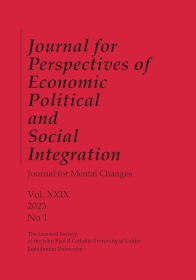Interrelations Between Politics and Education: Teaching English in Hungarian Kindergartens Since 1989
Abstract
The study explores changes in the Hungarian education system after the political change that occured in 1989-90. The paper focuses on changes in kindergarten language teaching practices and how the significance of learning another language at an early age arose. As part of the review of the literature on the topic, we draw attention to the European trends and principles in terms of early language teaching as well as foreign language teaching both before and after 1989 in Hungary. Another important date in the process is 2004, when Hungary joined the EU, which deeply changed the nation’s attitude to learning foreign languages. It influenced policy makers, teacher preparation, (early) language expectations and future fundings as well. We can see in the case of Hungary that political changes in society may dictate or indicate a shift in societal needs and expectations for how children should be educated.
References
Báthory, Z. (2000). A maratoni reform 2. Iskolakultúra, 11, 3–26.
Bauer, N. (2000). A korai idegennyelv – oktatás didaktikai kérdései. Veszprém Megyei Pedagógiai Intézet.
Bialystok, E., & Craik, F. I. M. (2010). Cognitive and Linguistic Processing in the Bilingual Mind. Current Directions in Psychological Science, 19(1), 19–23. https://doi.org/10.1177/0963721409358571
Domagała-Zyśk, E., & Podlewska, A. (2019). Strategies of oral communication of deaf and hard-of-hearing (D/HH) non-native English users. European Journal of Special Needs Education, 34(2), 156–171. https://doi.org/10.1080/08856257.2019.1581399
Doron, H. (2010). The Music of Language. Helen Doron Educational Group.
Enever, J. (2014). What can we expect of an early start to foreign language learning in Europe today? In É. Márkus & É. Trentinné Benkő (Eds.), A korai idegen nyelvi fejlesztés gyakorlata: konferenciaelőadások és háttértanulmányok (pp. 13–24). ELTE Eötvös Kiadó.
Enever, J. (2020). Global language policies. Moving English up the educational escalator. Language Teaching for Young Learners, 2(2), 162–191.
European Commission. (2012). Europeans and their Languages. https://op.europa.eu/hu/publication-detail/-/publication/f551bd64-8615-4781-9be1-c592217dad83
Furcsa, L., Sinka, A., & Szaszkó, R. (2014). A kisgyermekkori nyelvtanulás aktuális kérdései. Jászsági évkönyv, 1, 260–269. http://epa.oszk.hu/02200/02295/00022/pdf/EPA02295_jaszsagi_evkonyv_ 2014_260-269.pdf
Fülöp, K. (1982). Idegen nyelvek az óvodában – kérdőjelekkel. Óvodai Nevelés, 35(3), 75–77.
Józsa, K., & Nikolov, M. (2005). Az angol és német nyelvi készségek fejlettségét befolyásoló tényezők. Magyar Pedagógia, 105(3), 307–337.
Konishi, H., Kanero, J., Freeman, M. R., Michnick Golinkoff, R., & Hirsh-Pasek, K. (2014). Six Principles of Language Development: Implications for Second Language Learners. Developmental Neuropsychology, 39(5), 404–420. https://templeinfantlab.com/wp-content/uploads/sites/2/2017/12/Six-Principles-of-Language-Development-Implications-for-Second-Language-Learners.pdf
Kézi, E. (2014). A korai nyelvoktatás történeti aspektusai. In É. Márkus & É. Trentinné Benkő (Eds.), A korai idegen nyelvi fejlesztés gyakorlata: konferenciaelőadások és háttértanulmányok (pp. 99–104). ELTE Eötvös Kiadó.
Koloszár, I. (2010). Az angol nyelv az óvodában. Létünk, 4, 75–84.
Kovács, J. (2003). Néhány gondolat az iskoláskor előtti idegen nyelvi programokkal kapcsolatban. Nyelv+Info, 3, 10–14.
Lakatos, J. (2015). Külföldön dolgozó magyarok, Magyarországon dolgozó külföldiek. Statisztikai Szemle, 93(2), 93–112.
M. Batári, I. (2008). Párhuzamok az első és második nyelv elsajátításában – a korai nyelvi fejlesztés szemszögéből. In Á. Vámos & J. Kovács (Eds.), A két tanítási nyelvű oktatás elmélete és gyakorlata 2008-ban. Jubileumi Tanulmánykötet (pp. 61–72). Eötvös József Könyvkiadó.
Medgyes, P. (2012). Derűre ború – avagy a magyar idegennyelv-oktatás útja a rendszerváltozás óta. Köznevelés, 68(1–2), 22–25.
Molnár, B., Pálfi, S., Szerepi, S., & Vargáné Nagy, A. (2015). Kisgyermekkori nevelés Magyarországon. Educatio, (3), 121–128.
Murray, H. (2006). Review of The Globalization of English and the English Language Classroom, by C. Gnutzmann & F. Intemann (Eds.), ELT Journal, 60(2), 204–206.
Muszka, G. (2013). Az óvodás gyermek és az óvodai angoloktatás Debrecenben. [Unpublished manuscript].
Nádudvari, I. (1975). Az idegen nyelvoktatás néhány pszichopedagógiai vonatkozása, különös tekintettel az óvodáskorúakra. Acta Paedagogica Debrecina, 64.
Nádudvari, I. (1980). Az óvodai idegennyelv-oktatás problémájához. Acta Psychologica Debrecina, 4.
Nagy, L. V. (2020). Korai idegennyelv-elsajátítás Debrecen óvodáiban 2020-ban. [Unpublished manuscript].
Navracsics, J. (2000). A kétnyelvű gyermek. Corvina.
Oktaviandari, H. (2022). Learning English for Early Childhood. academia.edu/78777568/Learning_English_for_Early_Childhood
Pásztor, E. J. (2019). A játékos idegennyelvi foglalkozások megjelenése a magyarországi óvodákban 1959-től napjainkig, különös tekintettel a soproni és a Sopron környéki óvodákra. [Unpublished manuscript].
Piker, R. A. (2013). Understanding influences of play on second language learning: A microethnographic view in one Head Start preschool classroom. Journal of Early Childhood Research, 11(2), 184–200.
Varga, D. (2005). Mikor kezdjék a nyelvtanulást? Retrieved February 18, 2023, from http://nol.hu/archivum/archiv-368621-182566
Vekerdy, T. (1989). Az óvoda és az első iskolaévek. Tankönyvkiadó.
Copyright (c) 2023 Journal for Perspectives of Economic Political and Social Integration

This work is licensed under a Creative Commons Attribution-NonCommercial-NoDerivatives 4.0 International License.

